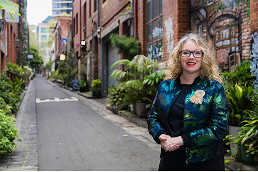Can we know everything?
On the first Tuesday of each month a new literary salon has opened up in the rustic basement of Bard’s Hypothecary in Crossley St.
You front up to the bar, order a drink then squeeze past the drinkers to descend a staircase.
Small café tables are scattered in the basement to create a speakeasy kind of setting.
Two empty chairs and a microphone up the front signal that some kind of performance is due to begin. Tension mounts.
Bookseller Robert Albazi introduces a guest writer. They’re both wearing checks and create a pleasing texture against the brick wall.
Robert has read the debut novel of Adam Ouston, a ghost writer and editor from Hobart, and the book is uppermost in his mind when he begins the interview.
First he talks about Ouston’s looping sentences, which he read “over and over again” then they focus on Houdini’s visit to Australia and the crash of the Malaysian airline Flight 370 over Ukraine in 2014.
A literary salon is the place where questions are raised and interviewers face problems of not giving too much away.
The pessimistic narrator of Ouston’s novel Waypoints has lost his wife and kid but this is not revealed until part of the way into the work.
Robert reveals this to be the underlying story that prompts the bereft father and partner to trawl through the internet for details of plane crashes.
It is up to the reader to decipher what happened in what he calls a “Wikipedic” novel and not to harangue the novelist over questions of suspense.
“It’s hard to be a rebel these days,” Ouston told the salon. “Everything seems to have sunk to a new low but it’s harder to rebel. Regardless of the life you choose there is always a cost.”
A story beneath the narration of a novel is sacrosanct and can’t really be revealed, hence the delicate manoeuvres around blurbs that preoccupy publishers.
Booksellers understand this. So do most readers. Reviewers are asked not to reveal tragedies that occur in fiction, putting them under quite a bit of pressure.
There is just one paragraph in Waypoints and this daring challenge for the reader follows a tradition of writerly experiments with form.
Lucy Ellman’s 2019 novel Ducks, Newburyport had just a few full stops and Will Self’s 2014 novel Phone was short-listed for the Goldsmiths Prize in 2017, and it had no paragraphs either. Ouston’s novel has been longlisted for the Miles Franklin.
The Paperback, which runs the salon, has copies of the novel available for sale.
The purpose of the salon is to promote the work of local writers and to delve into their style.
Waypoints is an information-heavy novel that delights in the idea that we can know everything thanks to Google and shouldn’t be making mistakes!
The Paperback salon, the first Tuesday of each month, Bard’s Hypothecary. •

Could the Metro Tunnel help Melbourne rediscover its mojo?




 Download the Latest Edition
Download the Latest Edition